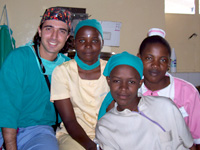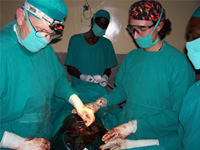Path to a Career Altering Experience

After 10 years of schooling and post-graduate medical training, the light was finally visible at the end of the tunnel. However, I was lost. Although in the past the next step always seemed clear, I just was not satisfied that I had found my niche as the end of residency approached. Over the course of the next year, I thought about a lesson I learned from a professor early in medical school. The lesson was not about how to treat a disease or interpret a test. It was about medical training. He told us of extensive literature showing a degradation in idealism that occurs throughout medical training. Although at the time, I thought that would never happen to me, I realized now it had.
I realized that the reason I was lost was that I was not fulfilling the goals and hopes I had set for myself upon entering medical school. Suddenly, I didn’t seem to be making the difference I thought I would. I searched long and hard for a chance to get back on track and eventually found out about the Mission Doctors Association. Through a fortuitous series of events, I got matched for a seemingly short-term mission with an MDA site that was hoping to establish an emergency department. So last fall, I left for Nyakibale Hospital in Uganda, not really knowing what to expect. What transpired over my five-week stint at the hospital altered my outlook on medicine and changed the entire direction of my career.
It didn’t take long for me to realize the impact that the planned emergency department could have on patient care. Throughout the month, there were countless cases of patients with acute illness being cared for by compassionate, smart doctors and nurses, who were working in a system lacking a crucial component. With the paving of a main road in front of the hospital, we saw numerous patients involved in road traffic accidents, but didn’t have the space to care for them or even to triage which ones needed care the most urgently.We also saw cases of young women who ended up having ectopic pregnancies, while waiting in the long lines at the clinic alongside patients who were there for outpatient check-ups of stable conditions. Although the diagnosis was often made quickly once they were seen, the patients were often critically ill by the time they got to the MDA surgeon, Bill Walsh. With skill and precision, he was able to operate on and save these sick patients, who were being supported and resuscitated by the Ugandan nurse anesthetists, but it was clear that there had to be a better way to get these patients the needed care before they were so close to death.

The days seemed to fly by. We were often busy seeing patients from morning until late into the night. Everyday I felt that I was learning more and more about clinical medicine. There were no CT scanners or fancy tests; in fact, the x-ray machine had not been functioning for months. We did have basic laboratory tests and ultrasound, but relied mostly on the clinical exam to make the diagnosis and initiate treatment. This was something the Ugandan doctors were clearly more comfortable and skilled at than I was. I kept thinking throughout the month, that although I came here to help and make a difference for patients, I was really the one gaining all the benefits from this trip.
As the time went by, I got to explore the region around the hospital. We had our Saturday ritual of going into Rukungiri, the closest town, to buy food for the week. Often times while we were in town, a person would approach Bill and thank him for taking care of him, showing off the injured hand Bill had repaired or how well he or she could walk on the leg Bill had casted. Other days I would go for short runs in the villages around the hospital, which usually attracted some attention from the locals, as there are few white people in the area. Sometimes, as I would run by, a group of local children would line up by the edge of the road and run along with me for a few hundred yards, smiling and laughing as we tried to out-run each other down the path.
I also got to spend a lot of time learning about the area from the students and nurses we worked with in the theatre. One of the nurses had me over for lunch several times so I could sample the local food. This kind of generosity was typical among the local people. In fact, every day when the students would bring food for a mid-morning snack, they would offer some to Bill and me.
As the time approached for me to head back home and finish out the last months of residency, the nursing students kept asking whether I would return. Although I was not quite sure how, I said I would knowing I was going to have to find a way to make it happen. I still felt that I had gained so much from the trip and given so little back. Despite this, as Bill and I ate our lunch on my last day, there was a knock at the door. The son of the nurse I had worked the closest with walked in with a cake decorated with the words “Thanks Dr. Mark.” When I thanked her for the cake later that day, she replied, “No, thank you for caring and coming to help us.”
Back at home and entrenched in my job hunt, I felt at a loss for how to really stay involved with Nyakibale. Although I would have loved to join MDA for a three year mission, financially I couldn’t do that at this point, and clinically it would be difficult to work abroad for three years and then return to a US-based job. After a few meetings with some of my more senior colleagues, I settled on a solution. A few months later I signed a contract for an 80% time job that would allow me two blocks of 1 month a piece to go work with Mission Doctors at Nyakibale. Currently, we have a grant in the works with the hope of obtaining funding for the construction and equipment we will need for the new emergency room.
This fall and again next spring, I will return to Nyakibale. Hopefully, over the course of the next twelve months, we will succeed in getting the emergency room constructed and functioning. It is going to be both exciting and gratifying to work with MDA on this project. As for me, after feeling lost for so long, I now have a new direction. Although I am still not sure where this path will lead me, I know now that I have at least found the right path.
NOTE: Mission Doctors Association is working to find funding to build and equip an emergency department for Karoli Lwanga Hospital in Nyakibale, Uganda. If you would like to learn more, or are interested in helping with this important work, please contact Elise Frederick directly at (213) 368-1875.
